 I'm not one for name dropping, and could, if I choose to, drop my share of notable names, as I've met many black celebrities over the years.
I'm not one for name dropping, and could, if I choose to, drop my share of notable names, as I've met many black celebrities over the years.Although I've never been a star gazer, or a star follower, taking count, I've had the privilege to meet a goodly number of them, which, given my humble beginnings, continues to amaze and please.
And like many other blacks--famous or not so famous, starry or not so stellar--I've waged a number of private, and public, wars against racism and have lived to tell it.
During those years, I never saw racism as an obstruction to my life goals, but merely as another obstacle to overcome. It wasn't that, like the president, I had a fractious congress to stand defiantly in my way, but an assortment of white figures with their own individual agendas, all equally determined to derail my progress.
One of those black notables I met was Nichelle Nichols, Lt. Nyota Uhura of Star Trek. A beautiful black woman with an equally beautiful disposition, and with stunningly beautiful eyes to match.
If the whole of her faded, as the Cheshire Cat faded in Lewis Carroll's Alice's Adventures in Wonderland, leaving behind only his toothy grin, Nichelle's eyes, similarly, would remain, many years hence, indelibly etched in memory.
They are just that remarkable--a remarkableness that photographs can never capture, or do justice.
You'd think that a beautiful, talented, black woman, such as Nichelle Nichols, would have escaped the ravages of racism, but alas, she had to face during the early years of her career the indignity of defending her humanity, and her self-worth against relentless forces that assailed her almost daily, not unlike many other black women, and men before and after her.
When television writer and producer Gene Roddenberry's "Star Trek" science fiction series debuted on NBC in 1966, the Civil Rights Movement -- under the leadership of Dr. Martin Luther King, Jr. -- was in high gear, fighting the injustices of racial segregation, black economic oppression and discrimination and racial violence against African Americans. [1]
And when Nichols landed the role of communications officer Uhura on the Starship Enterprise (see dual image below of her then and now), she had no idea that this was a breakthrough role for black women.
"It didn't hit me at the time until somebody told me," she told The Huffington Post. "I splashed onto the TV screen at a propitious historical moment. Black people were marching all over the South. Dr. King was leading people to freedom, and here I was, in the 23rd century, fourth in command of the Enterprise."
Nichols vividly recalls how America reacted when her Uhura character first hit the television airwaves.
"Oh, man, there were parts of the South that wouldn't show 'Star Trek' because this was an African American woman in a powerful position, and she wasn't a maid or tap dancer."
[This was not unusual. The South had its own rating system, barring many films that portrayed blacks in roles that showed them as equal to whites, or their better.]
While shooting "Star Trek" episodes in the late 1960s, Nichols didn't feel any discrimination on the set, but felt it in other parts of the studio, especially where she wasn't allowed to enter the studio through a particular gate where the other actors could go through.
"That's right. There were instances where I was turned away from entering the studio at the walk-on gate, and I had to go all the way around to the front gate, sign-in and come back. A guard on the set told me I had no right being there -- that they had replaced a blue-eyed blonde with me," she remembered.
"I went through crap, man. Racism was alive and rampant there. Some people said I wasn't good enough, saying things like, 'I don't know how you got this role.' And they kept waiting for me to complain and raise hell about it, but I decided to ignore it. I never went to Gene [Roddenberry] about it."
[Believe it or not, blacks were often accosted in this manner--as was I--although I made my living outside the movie industry. On many occasions whites would approach me and ask with incredulity, and anger, "How did you get this job?" Now, they weren't asking how they could go about entering the field in which I was employed, but how I managed to land a job that whites were having difficulty landing.
Did all of this make me bitter? At the time it made me angry, but the anger didn't last, and the bitterness that might have consumed me, and perhaps did consume some, faded like the Cheshire Cat, leaving only vague reminders of the flesh-tearing pain that only the sharp claws of hatred can inflict.]
She even said that the show photographer was a racist. "There are more pictures of me behind somebody where you can barely see me, but they also had to take pictures of me singularly."
As blacks, we were so often relegated to the background in this nation's history books, that we wrote our own. Additionally, we were so often forced to sit in the back of the bus, that we grew "tired" and weary of the affront and fought to sit where we pleased. We were told where we could live, what homes we could buy, and in which part of town our kind could reside, but we insisted on living anywhere we chose--anywhere we liked. We were told where we could eat, where we could sit, and where we could drink, but we defied those orders, too--as individuals, and finally collectively.
The Civil Rights movement started long before its often-cited, official start-up date, the Montgomery bus boycott of 1955-56, long before the Supreme Court decision—Plessy v. Ferguson, 163 U.S. 537 (1896). It started when Europeans brought the first slaves to this continent in 1565, right up to the Amistad mutiny and beyond--the period that we know as Jim Crow, extending from Reconstruction right through the mid-20th century.
Not to discredit Dr. King's momentous contribution to the Civil Right's movement, but there were black civil rights leaders before Martin Luther King, and after. All blacks who stood up to the dehumanization of racism--in small and large ways--were leaders in their own right, taking, as they did, their first steps against social injustice, which made it possible for others to do the same, as these others followed their example, and waged war, privately, and publicly, singularly and collectively.
To resist racism anywhere is to resist it everywhere, as it resides in our collective consciousness, requiring consent, and room to grow. We defeat it by denying it that consent and growing room, as we would weeds in a garden.
February is Black History Month. In recognition of the month, find below several sites that have brought together resources around people, themes, and events.
http://www.history.com/topics/black-history-month
http://www.africanamericanhistorymonth.gov/
http://www.infoplease.com/black-history-month/
http://www.cic.gc.ca/english/multiculturalism/black/index.asp
http://www.facebook.com/pages/Black-History-Month/44836849562
http://www.dltk-kids.com/crafts/black_history_month.htm
[1]
Yesterday, along with untold others, I learned of Whitney Houston's death. Many are in mourning for this songstress, which some are calling a "songbird." She was that and more. I posted the following on another blog. It pretty much sums up my feelings:
She will be missed. She won't be again, but, then, she will always be. A paradox for some, but for the cognoscenti a truism without contradiction. We're always at choice. She lived as she chose, and died at the time, the place, and in the way of her choosing.
She didn't live in vain, nor die in vain. All who knew her, and knew of her, received a benefit because she lived.
Her music wasn't her life, but it gave life to many. She touched us with her songs, and because of her incomparable voice--and the essence of her that flowed through her--we knew her in ways that are unforgettable, ways that say, "I believe in you and me."






